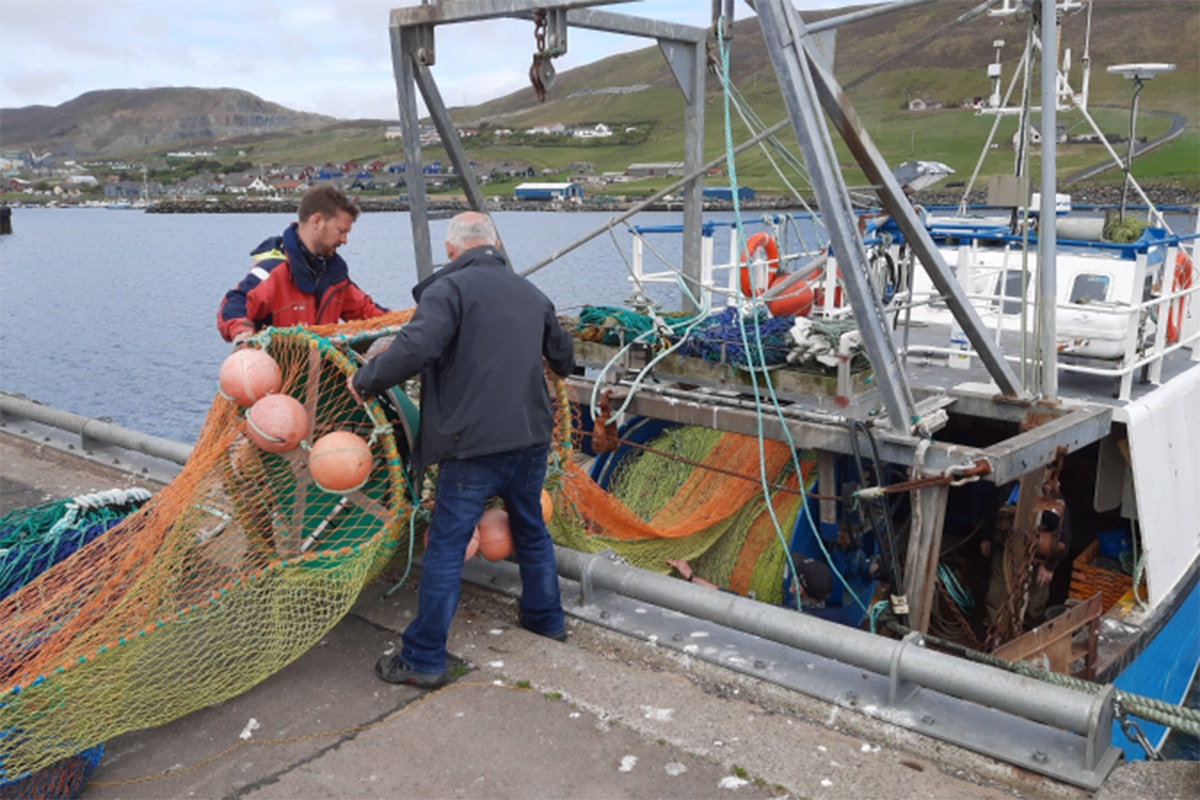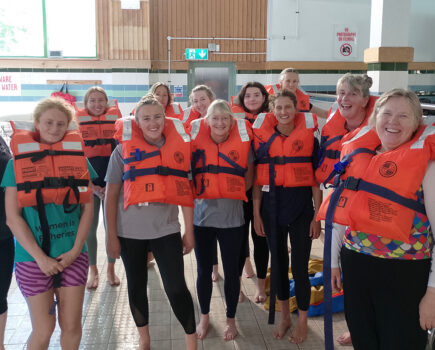At the London meeting at the end of November to mark the official expansion of Fisheries Innovation Scotland, now renamed Fisheries Innovation and Sustainability (FIS) and covering the whole of the UK, trustees and invited industry representatives were treated to a number of rolling presentations, as well as a detailed panel session that discussed the many ways in which FIS can help innovation across all sectors of the UK fishing industry.
The meeting highlighted that as with all industries, change and new technology can be both a threat and an opportunity. A key theme during the many discussions and presentations was the need to ensure that changes are industry-driven, rather than imposed by regulators or those from outside the industry.
Introducing the panel, FIS executive director Kara Brydson was the first to formally pick up on this theme, though smaller discussions around Fishmongers’ Hall had already emphasised this.
Welcoming the large group of attendees, she said: “Fishermen are the real innovators, who are also here. FIS is here to help us talk together of the work we can do.
“We’ve already championed a range of new projects, supporting the seafood industry as a whole, such as our Vessel of the Future concepts, by Duncan Boag of Macduff Ship Design, and our Smartrawl precision fishing system to help further reduce fishing gear impacts. Smartrawl inventor Professor Paul Fernandes isn’t able to be here as he is presenting at COP in Dubai, showing the breadth of expertise we are pulling together under our banner.”

The Smartrawl has three components: a stereo camera, taking images of fish in the trawl; an AI computer that determines species and size; and a gate controlled by the computer that retains valuable fish but releases unwanted catch alive and unharmed. A video of the gear in action, shown at COP28, can be seen here.
FIS chair John Goodlad said: “We’re at the cutting edge of new tech and innovation. There is so much good in our industry, so much potential. Innovation is still vital to further improve sustainability across all aspects of the industry. The presentations FIS has made today, and the panel discussion, are there to stimulate ideas, conversations, questions, not just amongst everyone present, but across our industry that will help us develop into the future.”
Three panel members then provided their own take on innovation across the fishing industry, and how best FIS could shape it. Dr Alexandra Leeper shared experience from the Iceland Ocean Cluster, a hugely successful project bringing together an array of very different companies involved in maximising the benefits of Icelandic fish landings.
Katrina Ryan, director of Mindfully Wired Communications, spoke about the role of communications in supporting seafood innovation, and how this is best achieved through genuine engagement with fishermen and seafood businesses. “While we embrace AI and new technology in innovation, it’s the human and cultural aspects of our industry that can help us stand out from the crowd,” she said.
Mike Mitchell, a longstanding executive at Young’s Seafood and a founder member of FIS, provided his thoughts on the organisation and how it could support a renaissance in the industry. “At Young’s, ‘sustainability’ started to be taken seriously around 2005,” he said. “We provided some initial funding for what became FIS in 2014, at which time there was a feeling that onshore processing and the catching of fish were separate entities. There was no real feeling that we were all part of a single value chain.
“Starting in Scotland, where we had over 2,000 shore-based processing staff, we looked at ways to engage better with the catching sector, starting off by funding cash prizes for vessels able to improve selectivity. Young’s is a large business, in a worldwide market, and we were able to see best practice operating elsewhere that UK catchers may be able to adapt and learn from.
“At the time, the UK had no focal point to drive this in the same way across the value chain. Along with some other funders, we helped to form FIS in 2014, at a time when the discards ban was dominating the conversation.
“Since then, we’ve had Brexit and Covid, growing awareness of the impacts of climate change, and ever more vocal NGOs making their own views on fisheries regulation known. All of this requires innovation and progress across all parts of the fish value chain if we’re to successfully adapt.
“FIS does need more partners onboard, increased income, and to widen the scope of what we look at – a new national initiative. I do see a growing number of retailers with a long-term interest in seafood wanting to embrace this new approach, and help to expand the scope of what FIS does.”
Lessons from Iceland: Ocean Cluster a huge success
Iceland’s Ocean Cluster mirrors an approach that has been seen in other sectors, particularly
IT, creating a central hub bringing together often very different businesses, from solo entrepreneurs to large multi- national businesses, where they can share expertise and ideas to develop new products.
Dr Alexandra Leeper, managing director of the Iceland Ocean Cluster, talked about the development of the cluster, and how it is now being emulated – and is supporting – similar developments in many other countries, as diverse as Namibia, the USA and Pacific island states.
“Ocean Cluster was founded in 2012,” she said, “as a space for collaboration and dialogue not just between fisheries experts, but a wide range of different skills and expertise. We’ve moved from 10 founding companies to 65 now. A lot of emphasis has been on maximising the value of every fish caught.
“Iceland at the time was generating 10m tonnes of fish waste a year – a huge waste of resources. Since then we’ve moved from utilising roughly 40% of landed weight for human consumption, to something closer to 90%, with a huge amount of added value as a result.
“Companies involved in the cluster have developed a wide range of products, from dried fish frames exported to markets in Nigeria, through to liver oil products and the retention and conversion of fish skins for use in skin graft operations, to a growing market for finished fish leather products that are taking the fashion world by storm, and even growing demand for fish collagen health drinks.
“This was all about fostering collaboration. Some big cuts in fish quotas were a reality check for many in the industry. We couldn’t simply catch more – we had to increase the value of what we already had.”
In response to questions about commercial secrecy and intellectual property, she said: “We’ve had issues with this in the US start-up that we’ve helped with. Initially individual companies can be very secretive. Collaboration at the start was very basic, such as sharing a cold store or logistics.
“Genuine collaboration isn’t always possible, but we’ve seen government funding, conditional on joint working, help break down some suspicions. Knowing what to share, and not to share, can help – for example, joint marketing may help get a new innovation sold or accepted. The cluster can also help on internal communications between possible partners, or during difficulties in development.
“Co-location of companies is a real help. ‘Coffee is key’, as we say, where companies in shared space can quickly and easily bounce ideas with each other. Our start-up in the Pacific islands isn’t co-located, but companies involved have a shared vision about the need to fight climate change, and this creates the unified mind approach.”
The development of technology to improve selectivity and animal welfare in the Nephrops fishery was, said Linda Wood from Marks and Spencer, a good example of the approach that the cluster had pioneered.
“Collaboration on our Nephrops work has involved 22 partners in all, including three fishermen, FIS, Seafish, Defra, DAERA, POs, tech companies and processors,” she said. “Without this, the project couldn’t work. We set off to solve one issue, often with totally different individual agendas, but we all have something to benefit. All the partners involved have conceded something, but this collaborative approach is the only possible way forward.”
This story was taken from the latest issue of Fishing News. For more up-to-date and in-depth reports on the UK and Irish commercial fishing sector, subscribe to Fishing News here or buy the latest single issue for just £3.30 here.
Sign up to Fishing News’ FREE e-newsletter here.








